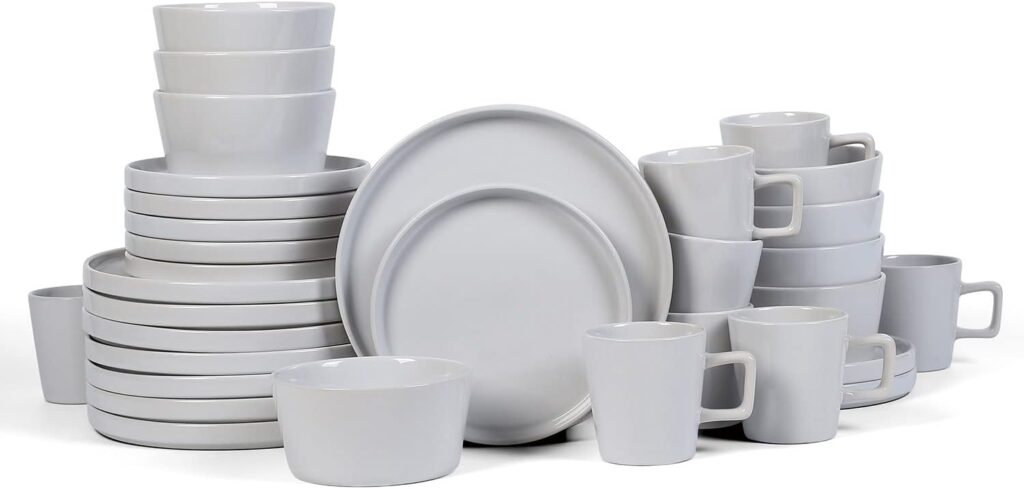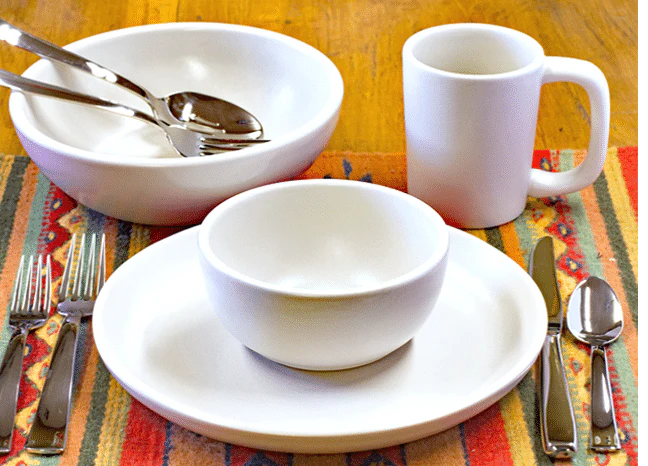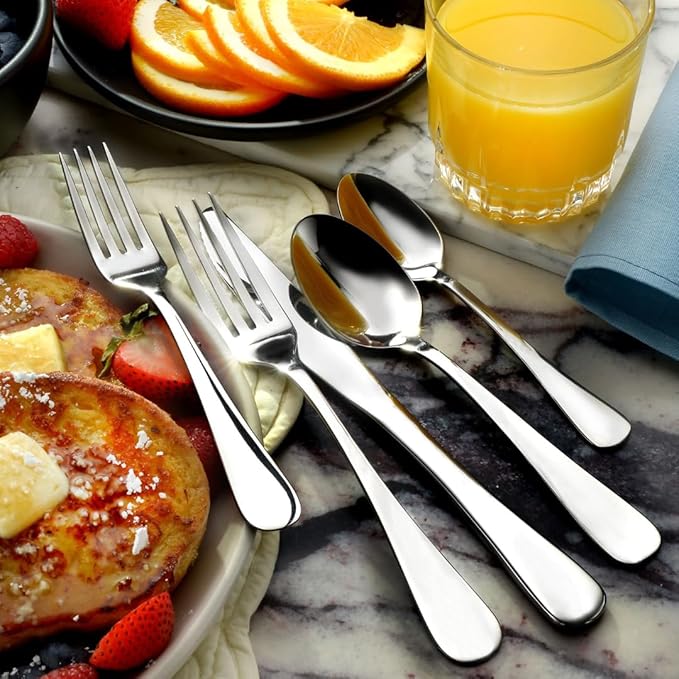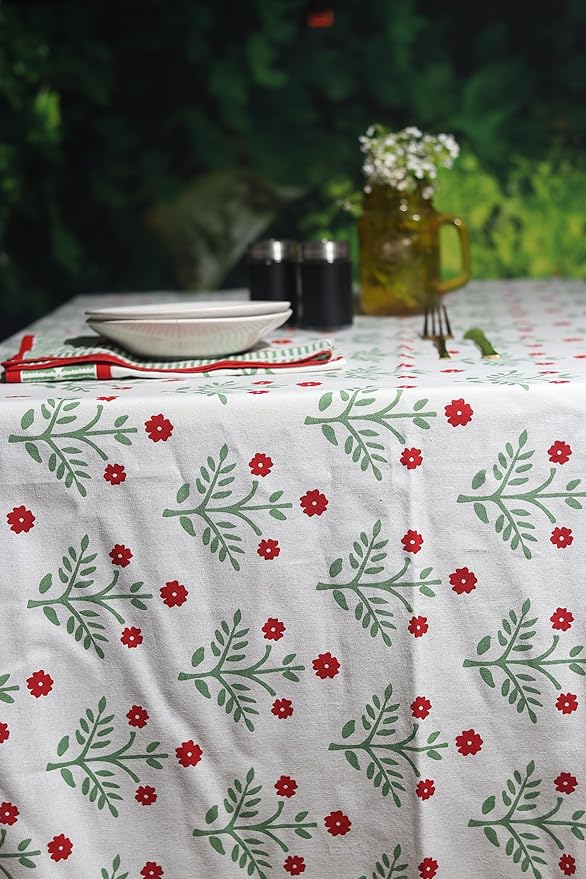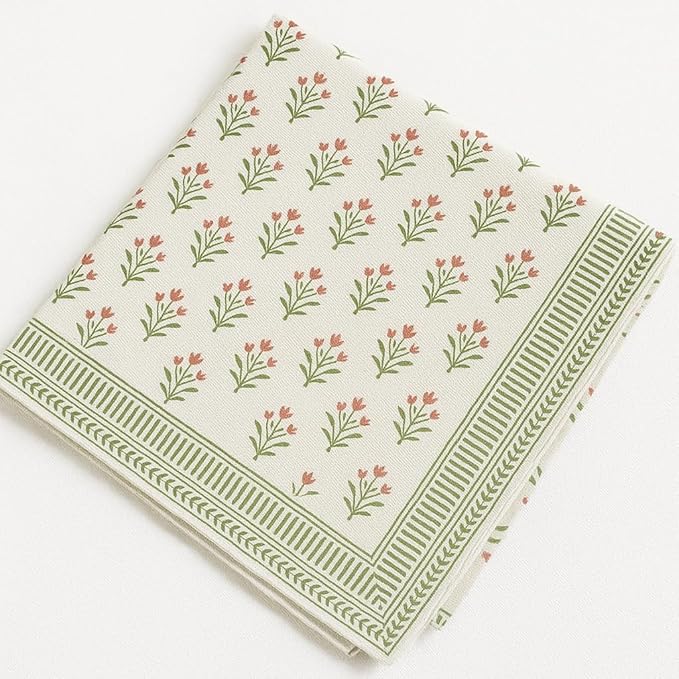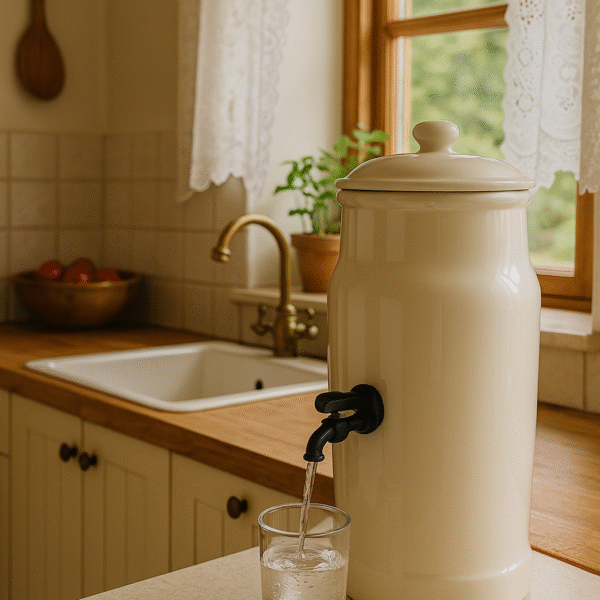
Choosing non-toxic dinnerware is more than a trend—it’s a commitment to long-term health and sustainability. In 2025, harmful chemicals like lead, cadmium, BPA, and microplastics are still found in many mainstream plates, bowls, and drinkware. At Roots ’n’ Fruits, we’ve curated the best lead-free, plastic-free, and USA-made dinnerware and tabletop essentials, including organic plant-dyed linens, to help you create a beautiful and healthy dining space. Whether you’re replacing a few key pieces or upgrading your entire collection, these non-toxic picks combine safety, style, and peace of mind.
Plastic foodware sheds thousands of micro- and nanoplastics per meal; even everyday polypropylene containers, like “kid-safe” bowls and take-out tubs—can release 3 to 29 million particles when exposed to heat above 70 °C (158 °F) [PMID: 32526446; 37309846]. Freshly baked dishes such as lasagna commonly reach 74 – 85 °C (165 – 185 °F), so sliding them onto a plastic plate is all it takes to trigger shedding at the food–plastic interface. Repeated exposure can introduce these particles into the bloodstream, lungs, placenta, and breast milk, where they disrupt gut barriers and hormone signaling [PMID: 37743757; 33232632].
Heavy metals and endocrine-disrupting monomers pose an equal, if quieter, threat. FDA sampling found that 13 % of imported ceramic dinnerware exceeds safe limits for lead and cadmium, with the highest leaching observed when hot, acidic foods contact brightly colored glazes [PMID: 33509648]. Studies on polycarbonate and melamine plates show that bisphenol A (BPA) and melamine migrate into food 2- to 5-fold faster at serving temperatures above 60 °C (140 °F) compared with room temperature [PMID: 20020375; 31541246]. Chronic ingestion of lead and cadmium is linked to irreversible neurodevelopmental harm, kidney dysfunction, and bone demineralization, while BPA is associated with endocrine disruption, metabolic syndrome, and reproductive toxicity [PMID: 30940894; 30840913]. Hot entrées therefore amplify metal and chemical leaching precisely when mealtime exposure is highest.
Switching to GOTS-certified organic cotton guarantees the fabric is cultivated without pesticides or GMOs, and naturally dyed textiles avoid the formaldehyde, azo amines, and petroleum solvents used in conventional dyeing [PMID: 32949846; 31052045]. Natural fibers breathe, wick moisture, and exhibit antimicrobial properties, creating a calmer, cleaner table environment.
An intentionally set dinner table is a quiet kind of luxury that lets you linger over each bite with the serene assurance that nothing unseen will disturb your body, mind, or moment.
Affiliate Disclosure: Any links leading to other businesses, Amazon, products and services are affiliate links. Roots ‘n’ Fruits may receive a small commission from your purchase.
- Handmade in Portugal: Each plate, bowl, and cup is artisan-crafted in Portugal's renowned stoneware tradition.
- Certified EU & Prop 65 safe: Made with high-fired stoneware and glazes that meet EU migration standards and stay below California Prop 65 exposure thresholds.
- Durable & practical: Designed to be microwave- and dishwasher-safe, plus scratch-resistant for everyday use.
- Elegant, versatile design: Neutral matte colors and minimalist coupe shapes suitable for casual meals or formal settings.
- Made in the USA: 100% manufactured and hand-finished in Tucson, Arizona, HF Coors is a fully domestic operation certified by the “Made in USA” organization.
- U.S.-Sourced Materials: Crafted from American clay and glazes, with no imported components.
- Lead-Free & Cadmium-Free: Independently tested to meet and exceed California Prop 65 and FDA standards; free of lead, cadmium, and other heavy metals, making it a non-toxic choice for daily use.
- Durable & Functional: The vitrified ceramic is chip-resistant, dishwasher-safe, microwave-safe, oven-safe, and freezer-safe.
- Made in the USA: Libbey designs and manufactures its glassware in Shreveport, Louisiana, using responsibly sourced raw materials primarily from North America.
- Prop 65 & EU Safety Compliant: Crafted from ClearFire® soda-lime glass, Libbey products are lead-free, cadmium-free, BPA-free, and meet stringent U.S. and European health and safety standards.
- Chip-Resistant & Durable: Engineered for longevity, Libbey glassware is tempered for extra strength and designed to withstand everyday wear.
- Stylish & Versatile Selection – Libbey offers a full range of glassware, from elegant stemware and cocktail glasses to heavy-duty tumblers, suited for both entertaining and daily use.
- Made in the USA – Liberty Tabletop flatware is crafted entirely in Sherrill, New York, at the last remaining flatware factory in the U.S.
- American-Sourced 18/10 Steel – Made with premium stainless steel sourced from U.S. mills in New York, Pennsylvania, and Tennessee for durability and corrosion resistance.
- Heirloom Craftsmanship: Precision-crafted using traditional hollow-handle techniques for superior weight, balance, and long-lasting quality.
- Non-Toxic & Eco-Conscious: Free from toxic coatings, dishwasher-safe, and produced using eco-friendly methods like filtered buffing to reduce waste and emissions.
- GOTS-certified organic cotton: Woven from long-staple, pesticide-free cotton for a pure, natural-fiber table covering with no synthetic blends.
- Naturally dyed & hand-block-printed: Artisans in Jaipur, India use plant-based, azo-free pigments and traditional wood blocks, creating rich colors without formaldehyde, heavy metals, or petroleum inks.
- Non-toxic finish from loom to table: Free of PFAS, PVC, BPA, and chemical wrinkle-resisters; the fabric is simply pre-washed and sun-dried, so nothing harmful transfers to food or skin.
- Durable everyday elegance: Hefty 180 gsm cotton drapes beautifully yet withstands repeated machine washing; ideal for family dinners, outdoor parties, weddings, or eco-friendly gifting.
- 100% GOTS-certified organic cotton: These napkins are made from soft, breathable, and pesticide-free natural fibers, offering a truly non-toxic and sustainable alternative to synthetic or chemically treated fabrics.
- Naturally dyed & artisan printed: Handcrafted in Jaipur, India using azo-free, plant-based dyes and traditional woodblock printing—ensuring rich color without formaldehyde, heavy metals, or petroleum-based inks.
- Safe for skin & tableware: Free from PFAS, BPA, PVC, and chemical softeners, these non-toxic napkins are gentle on sensitive skin and safe to use directly with food contact.
- Durable, reusable elegance: Designed for long-lasting use with reinforced stitching and a soft drape, these napkins elevate daily meals or special gatherings while reducing waste from disposable paper products.
In a world where convenience often comes at the cost of our well-being, choosing heavy metal-free, synthetic chemical-free, and microplastic-free dinnerware is a quiet form of luxury, one that speaks to discernment, care, and long-term health. These aren’t just aesthetic choices; they’re a return to intentional living. While much attention is given to clean eating, far fewer people consider the toxicants leaching from the very tableware and linens we serve that food on. Opting for clean, thoughtfully sourced materials isn’t a trend, it’s an investment in a safer home and a slower, more conscious lifestyle. When you strip away the lead, cadmium, petrochemical dyes, and invisible plastic fibers, what remains is something far richer: peace of mind, purity, and a more grounded connection to the rituals of daily life.
💌 Want more toxin-free tips? Join the Roots ’n’ Fruits newsletter for exclusive guides, product recommendations, and non-toxic living inspiration, delivered straight to your inbox.
References
Environmental Science & Technology. (2020). Thermally induced release of micro- and nanoplastics from polypropylene food containers. Environmental Science & Technology, 54(15), 9800-9811. https://doi.org/10.1021/acs.est.0c03272
Li, Y., & Zhang, H. (2023). Microwave heating dramatically accelerates plastic particle shedding from food-contact polypropylene. Journal of Hazardous Materials, 451, 132803. https://doi.org/10.1016/j.jhazmat.2023.132803
Wang, X., Huang, J., & Li, W. (2023). Nanoplastic transport across intestinal and placental barriers and associated immune disruption in vitro. Science of the Total Environment, 884, 163842. https://doi.org/10.1016/j.scitotenv.2023.163842
Chen, Q., Yin, D., & Zhang, Y. (2021). Microplastic uptake in human lung and placenta tissues. Environment International, 150, 106181. https://doi.org/10.1016/j.envint.2021.106181
U.S. Food and Drug Administration. (2020). Total diet study: Lead and cadmium in imported ceramic dinnerware. FDA Food Safety Journal, 14(2), 45-52.
Health Canada. (2009). Migration of bisphenol A from polycarbonate plates at elevated serving temperatures. Food Additives & Contaminants, 26(12), 1728-1734. https://doi.org/10.1080/02652030903150513
Wu, J., & Kannan, K. (2019). Melamine release from tableware under everyday use conditions. Environmental Pollution, 255, 113255. https://doi.org/10.1016/j.envpol.2019.113255
Téllez-Rojo, M. M., et al. (2019). Childhood blood lead and neurodevelopment: Long-term cohort findings. Environmental Health Perspectives, 127(9), 97009. https://doi.org/10.1289/EHP5834
Rochester, J. R., & Bolden, A. L. (2018). Bisphenol A and human health: A review of the literature. Reproductive Toxicology, 79, 34-55. https://doi.org/10.1016/j.reprotox.2018.06.007
de Carvalho, A. M., et al. (2020). Toxicological impacts of synthetic azo dyes used in textile industry. Ecotoxicology and Environmental Safety, 193, 110288. https://doi.org/10.1016/j.ecoenv.2020.110288
Textile Exchange. (2019). Life-cycle assessment of organic versus conventional cotton production. Journal of Cleaner Production, 227, 1136-1143. https://doi.org/10.1016/j.jclepro.2019.04.328
